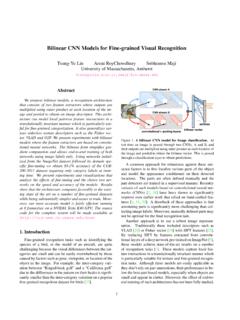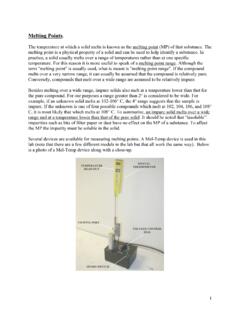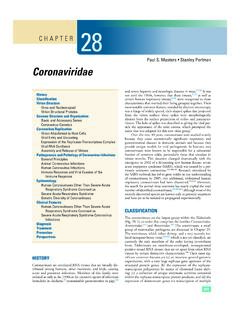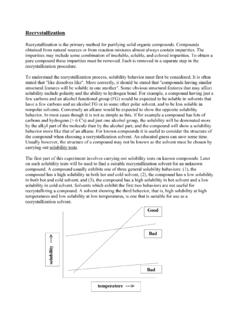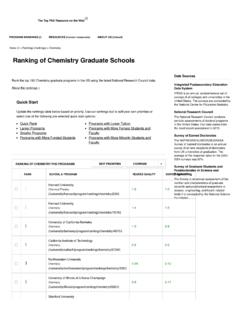Transcription of Procurement Policy - Harvard University
1 Harvard University . FINANCIAL Policy OFFICE. Responsible Office: Strategic Procurement Date First Effective: 7/1 Revision Date: N/A. Procurement Policy Policy Statement Harvard University requires that faculty, staff, researchers, students, or other individuals who plan for or purchase products, equipment, supplies, and services with University funds, base purchases on sound business practice, best value, accountability, and compliance with donor, sponsor and regulatory requirements. Individuals planning for or making purchases must follow this and other established Harvard University policies and procedures. Harvard University personnel must purchase goods and services using practices that are compliant with applicable laws, regulations and obligations and that are aligned with Harvard 's policies and objectives. The Federal Uniform Guidance mandates that purchases made with federal funds follow specific procedures and the University requires all purchases made with federal funds to follow these procedures.
2 In addition, all purchases must comply with all terms and conditions of the funding source. Finally, the University strongly encourages best practices for purchases made with non-federal funds. Whenever possible, all individuals purchasing on behalf of Harvard University should purchase goods and services from Harvard Preferred Vendors to reduce administrative burden and maximize the University 's buying power. If direction differs between this Policy and external regulations, sponsor or donor terms, or other internal Policy or procedures, the more restrictive instruction will apply. Reason for Policy This Policy is intended to ensure that Harvard University resources are used properly in purchasing activities. Consistent adherence to the Policy provides the reliability and assurance that purchasing activities meet regulatory requirements and sound business practice for acquisitions, contracts and third-party arrangements. The University expects individuals to make sound and ethical purchasing and contracting decisions that will ensure the continued and efficient operation of the University .
3 Who Must Comply All Harvard University personnel at all schools, tubs, local units, Affiliate Institutions, Allied Institutions and University -wide initiatives must comply with this Policy , as well as any non-employees making purchases on behalf of the University . This includes purchases made with a Purchasing Card (PCard), Corporate Card, purchase orders and payment requests generated using the Harvard Crimson Online Marketplace (HCOM), petty cash or electronic commerce, other systems used by Harvard ( , Aleph, Sutherland Global, PRESTO, etc.) as well as legitimate purchases of goods and services purchased with personal funds and later reimbursed. Processes I. For all Purchases, Regardless of Funding Source A. Adhere to Responsibilities of Purchasers and Conflict of Interest Standards. All purchasing activities conducted on behalf of Harvard University , whether performed by Strategic Procurement or other University employees and non-employees, and whether made with federal or non-federal funds, must follow the standards outlined in Appendix A.
4 These standards are intended as a supplement to Harvard 's existing conflict of interest policies (see Related Resources). In addition, individuals who make purchases with University funds, or who prepare or approve transactions using Concur, Corporate Card, HCOM, or PCard as well as any transactions that feed into the Title: Procurement Policy Page 1 of 17. Harvard University . FINANCIAL Policy OFFICE. Responsible Office: Strategic Procurement Date First Effective: 7/1 Revision Date: N/A. Oracle e-business suite from other systems ( , Aleph, Presto, Sutherland Global, etc.) must follow the Responsibilities of Purchasers, Preparers and Approvers Policy (ROPPA). New users to the HCOM and PCard systems as well as approvers in the Concur system must complete an on-line training prior to using the system(s). Other systems which have an approver component may require ROPPA Training. Contact your local Finance Office for guidance. Faculty ROPPA training requirements are at each School's discretion.
5 B. Follow required procedures for Special Purchases governed by other policies. Certain purchases carry additional restrictions per Harvard Policy . Please refer to University and local tub policies and procedures for the following purchases: 1. Air Emission Source Compliance (prior to buying equipment). 2. Alcohol and Tobacco (purchases of alcohol and tobacco may be subject to taxes). 3. Animals Live 4. Chemicals Facility Anti-Terrorism Standards Chemicals of Interest 5. Controlled Substances 6. Employee and Nonemployee Gifts and Celebratory Events 7. Firearms Prohibited by massachusetts General Law. Contact Harvard University Police Department for additional guidance. 8. Human Subjects Use of and Processing Payments 9. Independent Contractor Policy 10. Radioactive Materials 11. Select Agents 12. University Purchasing Card Policy 13. University Staff Mobile Phone Policy 14. University Travel Policy C. Use Harvard Preferred Vendors whenever possible. Harvard Preferred Vendors have been selected through a formal sourcing process resulting in a contract and/or pricing agreement with negotiated pricing, terms and conditions favorable to Harvard .
6 Using Preferred Vendors meets the Uniform Guidance requirements for small purchases (purchases between $10,000-$250,000) 1. Strategic Procurement is the only office which may classify a vendor as a Preferred Vendor. If a school or unit has negotiated an agreement with a vendor/contractor and they meet certain requirements, they may qualify as a Preferred Vendor. Contact Strategic Procurement or review the Procure-to-Pay Manual regarding the classification process for Preferred Vendors. Purchase Type List May be Found at: Travel All vendors on Harvard 's Travel and Reimbursements site are Preferred Vendors Goods and Services A complete list of Preferred Vendors may be found at Strategic Procurement Note: Harvard may access additional competitively bid contracts conducted by different group purchasing organizations (GPO) and consortia some examples are E & I Cooperative Services, Mass Higher Education Consortium (MHEC) and Communities. Contact Strategic Procurement for more information. Note: If retaining an individual (incorporated or not) for services, be sure the individual is properly classified as either an employee or an independent contractor before the work is started.
7 See the Independent Contractor Policy . 1. Harvard 's Procurement thresholds are based on the National Defense Authorization Act of 2017 (NDAA-17) as well as OMB Memorandum 18-18 published June 20, 2018. Title: Procurement Policy Page 2 of 17. Harvard University . FINANCIAL Policy OFFICE. Responsible Office: Strategic Procurement Date First Effective: 7/1 Revision Date: N/A. D. Apply tax exemptions where applicable. Harvard is a massachusetts tax-exempt corporation and qualifies for tax exemptions in some states on purchases of goods or services (Cert. # E042103580 - Form ST-2). In massachusetts , Harvard is exempt from sales and meals tax, but not exempt from room tax. This applies to all purchases; both made via the PCard, Corporate Card, through direct billing or reimbursements to individual for out-of-pocket expenses. In order to obtain an exemption, the purchaser may need to provide required state forms to the vendor. See the Tax Exemption Write-Up for additional guidance. Note: When using federal funds, cost-share funds, or expenses being transferred onto federal funds, if a purchaser fails to use Harvard 's tax exempt status where allowed, the taxes may not be charged to a federal award.
8 The taxes must be charged to non-federal funds using object code 8450. If Harvard is required to pay the taxes ( , room tax or other states where Harvard does not have tax exempt status), then the tax may be charged to the federal award using the appropriate expense object code. See the Sponsored Expenditures Guidelines. Note: Resale of items may require payments of Unrelated Business Income Tax (UBIT) or sales tax: Contact your local Finance Office for additional guidance. II. For Purchases with Federal Funds A. Follow required practices for purchases with federal funds (fund ranges 100000-199999), cost-share commitments or expenses journaled onto federal funds. Harvard University receives significant funding from federal sources and you must comply with the federal regulations for purchases with Federal funds, cost-share commitments as well as expenses journaled onto federal funds. See Appendix B for a summary table of purchase requirements. These purchases are reviewed by the Office for Sponsored Programs (OSP) for compliance with the Federal Regulations ( , Debarment) and are subject to internal and external audit.
9 Departments are required to retain back-up documentation, such as bids, quotes, and cost/price analyses, on file for federal auditors. See Section for retention schedules. B. Complete a Vendor Justification Form (VJF): Purchases over $10,000 using federal funds, cost-share funds or expenses journaled onto federal funds require documentation to support the selection of a vendor. Schools must complete the HCOM electronic VJF for federal purchases over $10,000. Purchases with cost- share funds or expenses journaled onto federal funds must meet the VJF criteria; however, the HCOM. Electronic VJF is activated only when federal funds are used. Approvers should review the documentation for completeness prior to approving requisitions or payments in HCOM. The information requested on a VJF (see Appendix C) meets the supporting documentation requirements around justification for the selection of a vendor. At the discretion of the school or unit, a paper VJF may also be used as a tool to help guide the purchaser regarding the vendor review and selection requirements and processes.
10 In all cases, supporting documentation such as copies of bids or quotes and cost or price analysis must be kept on file (see Section ). See Appendix B for a summary of purchase requirements. Note: A subcontract formally negotiated through and signed by the Office for Sponsored Programs . University Area or the Office of Research Administration or Sponsored Program Administration in the Longwood Medical Area does not require a VJF since the contract's scope of work and terms should adequately reflect vendor selection justification and contain Debarment Language. In cases of formal OSP. subcontracts, the HCOM preparer would select sole source for justification and note in the justification explanation that it is a formally-negotiated and signed OSP subcontract. Title: Procurement Policy Page 3 of 17. Harvard University . FINANCIAL Policy OFFICE. Responsible Office: Strategic Procurement Date First Effective: 7/1 Revision Date: N/A. C. Obtain debarment documentation where required: Purchases of any amount from debarred vendors cannot be charged to federal funds, cost-share funds, or expenses to be journaled onto federal funds.
